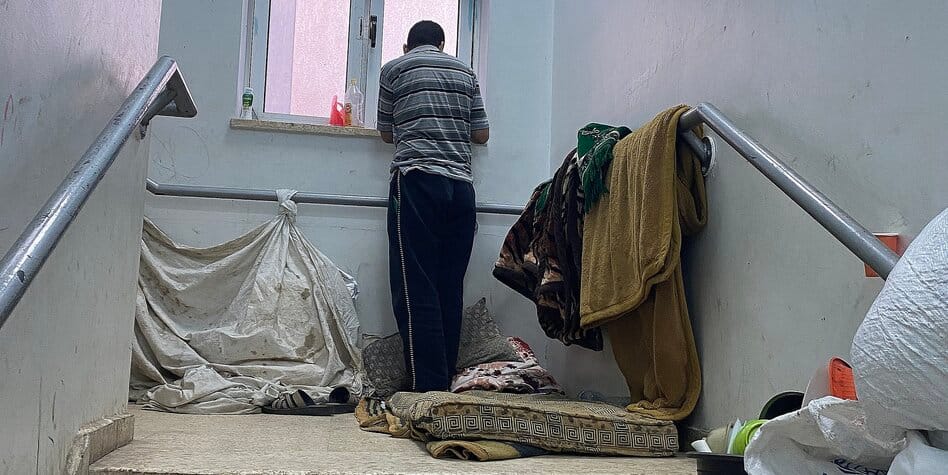Dust, Mosquitos and War
Next to me, in the same school room where I sleep, separated from my uncle's wife by a curtain, she and her daughter sleep. All night, she wakes up saying, "Go away, go away," referring to the mosquito.

At seven o'clock in the morning, I lie on my back, caught between sleep and wakefulness, enduring a day after which I cannot sleep at night. The noises disturb me: the constant sound of airplanes, the sound of people shouting at each other because they have nothing else to do—they shout, and when you ask them why, they say a mosquito bite has made their nerves boil, and they can't stand to hear anyone else's voice. At three in the morning, a man in the tents was shouting at another man and his young son because their voices hadn't quieted from morning to night, and they couldn't sleep. He told them if you and your son don't quiet down, I'll come up and hit you. The child couldn't sleep because of the mosquito bites.
Next to me, in the same school room where I sleep, separated from my uncle's wife by a curtain, she and her daughter sleep. All night, she wakes up saying, "Go away, go away," referring to the mosquito. When sleep finally takes her, she is startled awake by the sound of bombing and cannot sleep. Nor can I sleep until I clearly see daylight.
Each time I go to handle my father's medical needs, passing through the hospital staircase that leads to the surgery room, I see displaced families sleeping there, having found no other place neither in the tents nor inside the hospital. All hospital staircases are like this. I always see a man with his wife and children and ask myself, how can they endure the sound of footsteps day and night? How do they sleep? When do they sleep? Overwhelmed by curiosity, and because his silence puzzled me more than the failed negotiations for the past six months, I approached him with soft steps to talk. I found his wife sitting there, I apologized for intruding but explained I am a writer and wanted to talk to her husband. She told me he was here just five minutes ago. I told her I would return to him but also wanted to speak with her. I asked her about her life and sleep here on the staircase, why particularly the staircase? She said we found no other place but the staircase; the hospital was full of displaced people. When I sleep, I must cover my face so I do not see the feet of those passing by me. We had a two-room and one-bathroom house made of asbestos, I used to see it as small and insufficient, but now I want to return to it instead of the staircase, but I can't go back to the border town of Abasan because the occupation destroyed everything there. I left Naveen with her daughter and told her I would return for her husband.
Her husband, Mohammed Abu Ouda, a Palestinian Algerian, with an Algerian mother and a Palestinian father, I returned to him after ten o'clock at night. I introduced myself and he mentioned his wife had told him about me. We walked a bit, and he told me about his respiratory illness, which requires that he avoid dust and stay in a place without moisture like where he sleeps. I asked him if there was a chance for him to move to another place, would he take it? He said he couldn't because he suffers from bouts of suffocation and the staircase is close to the hospital's emergency room; it takes only one minute to reach them and get treatment, but if he went to another place, he couldn't do that with the disruption of his medication. Mohammed is trying to travel with his wife but has not been able to so far. He fears walking long distances in case he has an attack and no one is able to help him due to the shortage of hospitals and medicine. He tries to walk in the hospital corridors, maybe to hear news of the cessation of the aggression on the Gaza Strip, and walk to his house even if it costs him suffocation.
The text was published in German in Taz newspaper
